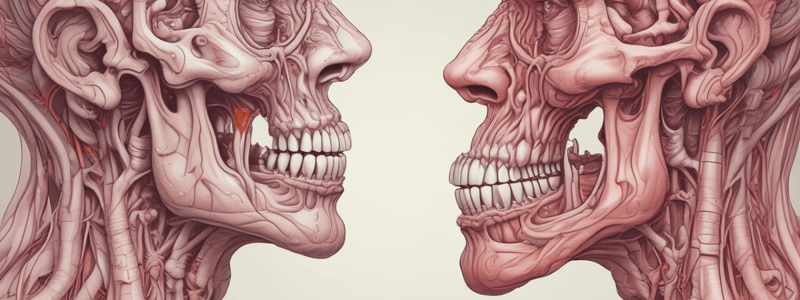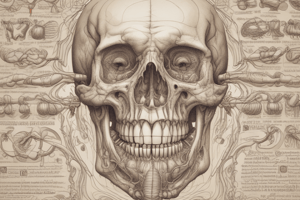Podcast
Questions and Answers
What is the primary role of enzymes in the mouth concerning starch and lipid breakdown?
What is the primary role of enzymes in the mouth concerning starch and lipid breakdown?
- To neutralize acids in food
- To enhance the taste experience (correct)
- To fully digest nutrients for absorption
- To increase the pH of saliva
What happens to the pH of the mouth when consuming excessive sugar?
What happens to the pH of the mouth when consuming excessive sugar?
- It remains constant at 7.0
- It decreases below 5.5 (correct)
- It rises above 7.0
- It fluctuates between 5.5 and 7.0
Which compounds in glucose can contribute to lower pH levels in the mouth?
Which compounds in glucose can contribute to lower pH levels in the mouth?
- Phosphate groups
- Carbonyl groups
- Hydroxyl groups (correct)
- Glycosidic bonds
Why is the breakdown of starch insufficient for nutrient absorption?
Why is the breakdown of starch insufficient for nutrient absorption?
What is a potential consequence of a pH drop to less than 5.5 in the mouth?
What is a potential consequence of a pH drop to less than 5.5 in the mouth?
How does the breakdown of food aid in taste perception?
How does the breakdown of food aid in taste perception?
What is the primary purpose of the mouth in the digestive process?
What is the primary purpose of the mouth in the digestive process?
What is the term used for the process of chewing?
What is the term used for the process of chewing?
Which part of the mouth is known as the buccal cavity?
Which part of the mouth is known as the buccal cavity?
Which types of muscles in the tongue allow for the elevation or depression of the tongue's tip?
Which types of muscles in the tongue allow for the elevation or depression of the tongue's tip?
What are intrinsic muscles in the context of the tongue's structure?
What are intrinsic muscles in the context of the tongue's structure?
How does the tongue help in changing its size during the process of mastication?
How does the tongue help in changing its size during the process of mastication?
What is the initial form that food takes in the mouth to aid digestion?
What is the initial form that food takes in the mouth to aid digestion?
What role does the tongue play in the manipulation of food in the mouth?
What role does the tongue play in the manipulation of food in the mouth?
What is the primary function of the muscles that run from the tip to the back of the tongue?
What is the primary function of the muscles that run from the tip to the back of the tongue?
Which enzyme is primarily released by Von Ebner's gland?
Which enzyme is primarily released by Von Ebner's gland?
What percentage of saliva is released by the submandibular glands?
What percentage of saliva is released by the submandibular glands?
What is the role of mucin in the saliva?
What is the role of mucin in the saliva?
Which gland is identified as the largest salivary gland?
Which gland is identified as the largest salivary gland?
Which enzyme is responsible for breaking down carbohydrates like starch?
Which enzyme is responsible for breaking down carbohydrates like starch?
What content do parotid glands primarily release?
What content do parotid glands primarily release?
What is the main purpose of hydrolysis in the mouth during digestion?
What is the main purpose of hydrolysis in the mouth during digestion?
Which of the following glands contributes the least to saliva production?
Which of the following glands contributes the least to saliva production?
How do the muscles that run side-to-side contribute to tongue movement?
How do the muscles that run side-to-side contribute to tongue movement?
Flashcards are hidden until you start studying
Study Notes
Mouth and Digestion Overview
- The mouth, also known as the oral cavity or buccal cavity, is the first site of digestion.
- Its primary role is to convert food into a bolus, a sphere that is easier to digest.
Mastication
- Mastication, the scientific term for chewing, is essential in preparing food for digestion.
- Teeth and the tongue (lingula) are crucial for effective mastication.
Tongue Musculature
- The tongue consists of extrinsic and intrinsic muscles:
- Extrinsic muscles: Anchor the tongue and allow movements such as elevation, depression, protrusion, and retraction.
- Intrinsic muscles: Change the size and shape of the tongue during contraction, running anterior to posterior and side-to-side.
Hydrolysis in the Mouth
- Hydrolysis involves enzymes breaking down macromolecules into smaller components.
- Saliva, produced by various glands, contains enzymes that facilitate this process.
Salivary Glands
- Parotid glands: Largest salivary glands, located near the jawbone, release approximately 25% of saliva, predominantly serous (rich in enzymes).
- Submandibular glands: Located below the mandible, they release about 70% of saliva, with a mix of serous and mucinous content.
- Sublingual gland: Situated below the tongue, it contributes about 5% of saliva and is primarily mucinous.
- Von Ebner's gland: Located at the tip of the tongue, it makes up less than 5% of saliva and releases lingual lipase, which breaks down triglycerides into free fatty acids and glycerides.
Enzymatic Functionality
- Alpha-amylase: Found in saliva, it specifically breaks down starches into smaller carbohydrates.
- Lingual lipase from Von Ebner's gland targets lipids, breaking them down into free fatty acids, diglycerides, and monoglycerides.
Nutritional Absorption and Taste
- Enzymatic breakdown in the mouth is insufficient for nutrient absorption but enhances taste perception of food items.
Impact of Sugar on Oral pH
- Excessive sugar can lower oral pH below 5.5, leading to demineralization of teeth due to acidic conditions.
- The mouth typically maintains a neutral pH around 7.0, but elevated sugar levels can disrupt this balance.
Studying That Suits You
Use AI to generate personalized quizzes and flashcards to suit your learning preferences.



